A SELECT will take a shared lock on the rows, but it shouldn't effect
inserts correct?
No, it's not exact.
When you make a SELECT, it can acquire shared locks on pages and even on the whole table,
you can test it by yourself by using paglock or tablock hints (of course you should use repeatable read or serializable to see them, as all the shared locks in read committed are released as soon as they are no needed anymore).
The same situation can be modelled this way:
if object_id('dbo.t') is not null drop table dbo.t;
select top 10000 cast(row_number() over(order by getdate()) as varchar(10)) as col
into dbo.t
from sys.columns c1
cross join sys.columns c2;
set transaction isolation level serializable;
begin tran
select *
from dbo.t
where col like '%0%';
select resource_type,
request_mode,
count(*) as cnt
from sys.dm_tran_locks
where request_session_id = @@spid
group by resource_type,
request_mode;

Here you see lock escalation result, my query wanted more than 5000 locks per statement so instead of them server took only one lock, shared lock on the table.
Now if you try to insert any row in this table from another session, your INSERT will be blocked.
This is because any insert first need to acquire IX on a table and IX on a page, but IX on a table is incompatible with S on the same table, so it will be blocked.
This way your select could block your insert.
To see what exactly happens on your server you should use sys.dm_tran_locks filtered by both your session_id.
